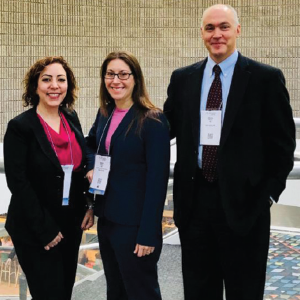A Day in the Life of a Clinical Team Leader

From left: Dr. Habal, Dr. Glaser and
Dr. Nikolov.
Rachel Glaser, MD, says as clinical team leader in the Division of Pulmonary, Allergy, and Rheumatology Products, her daily work activities involve interesting and challenging scientific discussions with a multidisciplinary team including statisticians, clinical pharmacologists, pharmacologists/toxicologists and chemists, among others.
“We communicate directly with patients and other members of the community during patient-focused drug development meetings and FDA listening sessions,” she says, “which provides us an opportunity to hear directly from patients about the impact of their disease on their daily lives.”
Her team also interacts with physicians, researchers and industry at advisory committee meetings, workshops, conferences and other meetings, and meets with industry at regular intervals during the development of drugs and biologics. “And there are opportunities for more general discussion about drug development in particular disease areas, as well,” she says.
Dr. Glaser has regular meetings to discuss ongoing clinical development programs in rheumatology and reviews the efficacy and safety of drugs and biologics. She also assesses the risks and benefits of treatment for specific rheumatologic diseases and conditions and, ultimately, helps draw conclusions regarding whether these treatments should be approved for use in the U.S.
She says the biggest unmet need in rheumatology is to provide treatments to those with limited available options. “We have made enormous strides in the last several decades in the treatment of several rheumatologic diseases, such as rheumatoid arthritis and psoriatic arthritis; however, there are many diseases for which we have no approved therapies to offer patients,” Dr. Glaser says.
A board-certified internist and adult rheumatologist, Dr. Glaser first learned about the FDA as a potential career during fellowship where several of her attendings were FDA clinical reviewers. She ultimately joined the FDA about five years ago after working in clinical practice for several years.
Training & Background
While Dr. Glaser says the FDA’s clinical reviewers and clinical analysts have diverse training and backgrounds. She relies on her clinical training and experience as a physician in her work for the FDA every day. And she continues to see patients weekly.
“My clinical experiences complement my work at the FDA by providing the context of what is important to patients and providers, and also a better understanding of rheumatic diseases,” she says. “This helps me and the rest of the team assess the benefit risk for new therapies and new indications.” She adds that seeing patients regularly is also essential to keeping her clinical skills sharp.
Dr. Nikolov says a clinical background is critical to better understanding how to apply the benefit-risk assessment from a patient to the population.
“Having a subspecialty in rheumatology is another asset to better understand how to apply the regulatory framework in drug development for specific rheumatologic diseases,” he says.



